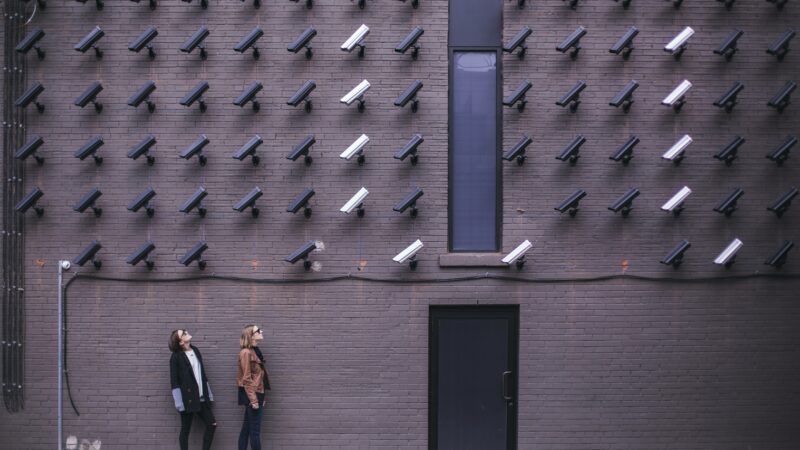Houston Says Businesses Must Install Surveillance Cameras and Cops Can View Footage Without a Warrant
Plus: The Warrant for Metadata Act, DOJ will appeal order ending mask mandate, and more...

Houston mandates spying outside bars and other businesses. Officials in Houston, Texas, have voted to require an array of businesses—including bars, convenience stores, and strip clubs—to install surveillance cameras and make footage from them readily available to police. The dystopian move is a transparently unconstitutional attempt by city leaders to circumvent Fourth Amendment protections against unreasonable searches and seizures.
To access video from the cameras, police officers will not need a warrant.
The rules apply to all Houston bars, convenience stores, game rooms, nightclubs, or sexually-oriented businesses.
Owners of these establishments must install (on their own dime) surveillance cameras in outdoor areas "providing video coverage from the exterior of the building to the property line." Businesses must keep these cameras running 24 hours a day, and store camera footage for at least 30 days.
If surveillance footage is requested by the Houston Police Department, businesses must turn it over within 72 hours. Failure to comply would mean fines of $500 per day.
The Houston City Council approved this privacy-killing measure on Wednesday by a vote of 15–1.
"Their vote demonstrated a willingness to push aside constitutional protections and subject Houstonians to overbroad police searches," said Savannah Kumar of the American Civil Liberties Union of Texas. "But a city cannot override the Constitution. We are here to help you protect your rights. If the police come knocking on your door, tell them to get a warrant, whether it's your home or your business."
The measure is set to take effect in 90 days.
"In addition to trampling on the Fourth Amendment rights of business owners, Houston's new law also infringes on property rights," said Institute for Justice Attorney Jared McClain. "This ordinance unfairly saddles certain businesses with thousands of dollars in new expenses to install high-definition surveillance cameras and to archive their footage so it's available for police on demand."
"If you commit a crime, you can rest assured that we will be right on your trail," said Houston Mayor Sylvester Turner at a press conference about the new law.
FREE MINDS
Seeking metadata? Come back with a warrant, says congressman. The Warrant for Metadata Act, introduced yesterday by Rep. Ted Lieu (D–Calif.), would require federal law enforcement agencies to get a warrant before demanding tech companies turn over cloud-stored metadata. "While federal law shields certain data against warrantless government surveillance, agencies can seize metadata from third-party cloud providers without a warrant," explains The Washington Post.
"As a recovering computer science major, I recognize metadata is incredibly important," Lieu said in a statement:
In Ukraine, for example, reporters are able to use the metadata collected from digital photos on social media—like the location a photo was taken and whether it has been manipulated—to verify the photos' legitimacy. Organizing and analyzing metadata can offer a wealth of information for individuals and businesses to help with things like decision-making and operations.
But, with this wealth of information comes potential risks, especially where civil liberties are concerned. Right now, a governmental entity can seize an individual's metadata stored on the cloud without needing a warrant. Current law has failed to keep up with the advancements and nuances of technology related to cloud computing. That's why I'm pleased to introduce this bill to amend the [Stored Communications Act] and require that a warrant be obtained to gain access to Americans' metadata stored on the cloud.
FREE MARKETS
Biden administration will appeal order ending transportation mask mandate. Yesterday's Roundup focused on the federal court ruling striking down the Centers for Disease Control and Prevention's (CDC) travel mask mandate and the Department of Justice's pledge to appeal the court's decision if the CDC says masks should still be required on planes, trains, buses, and subway systems. Well, now the CDC has weighed in (surprising no one) and says, yes, masks should still be required and the ruling should be appealed.
QUICK HITS
Huh. Is the famous Dunning-Kruger effect based on a statistical mistake? https://t.co/8RbHFLw1Rl
— Julian Sanchez (@normative) April 21, 2022
• Lawmakers mull a revision of the Insurrection Act.
• Alan Cole and Jim Pethokoukis talk anti-growth politics.
• "There was — and remains — no public health evidence that singling out asylum seekers or other migrants for exclusion is effective in stemming the spread of Covid-19," write a team of academics and doctors in a New England Journal of Medicine piece on Title 42 and "misusing public health as a pretext to end asylum."
• The 9th U.S. Circuit Court of Appeals won't reconsider its order upholding California's net neutrality law.
